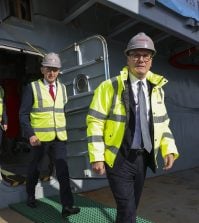What a Trump presidency means for other governments

As citizens of the USA come to terms with the shock victory of Donald Trump in yesterday’s presidential election, most other parts of the world will be waiting in anxious anticipation to see how the man chosen as the 45th US president operates on the global stage.
In the run-up to the election, one of the Republican nominee’s key campaign slogans was ‘America First’ – a principle he said would underpin his dealings on international issues including trade, climate change and defence, and one likely to have effects that reach far beyond US borders.
Much of Trump’s election bid was fought on rhetoric rather than detailed policy prescription. However, he has said enough on specific issues to offer some clues on what governments in other parts of the world can expect from the new US administration when Trump takes office on 1 January 2017.
Trade
Trump has been clear that he will renegotiate or withdraw altogether from a number of international trade agreements, and introduce policies aimed at putting American interests first and closing what he said were “huge” trade deficits with rival economies – notably China and Mexico.
Specific proposals include withdrawing from the Trans-Pacific Partnership, a so-far unratified trade agreement between 12 Pacific Rim countries (not including China).
Trump has also pledged to immediately renegotiate the North American Free Trade Agreement between the US, Canada and Mexico, which he said had been a “total disaster” for the US. Mexico has been a particular focus for Trump’s protectionist trade stance: as well as the notorious plan for a border wall between the US and Mexico, he has also promised to introduce a 35% import tax on certain products made in Mexico.
On China itself, Trump has made a number of pledges, including bringing a number of trade cases against China, both domestically and via the World Trade Organization, to tackle what he described as China’s “unfair subsidy behaviour”.
“China respects strength, and by letting them take advantage of us economically, we have lost all of their respect,” Trump said in an April speech. “We have a massive trade deficit with China; a deficit we must find a way, quickly, to balance. A strong and smart America is an America that will find a better friend in China. We can both benefit or we can both go our separate ways.”
Defence and foreign policy
For America’s foreign allies, among Trump’s most worrying declarations have been his comments on strategic defence relationships – particularly NATO.
Trump has claimed that aside from the US, only four of NATO’s 28 members have spent the requisite 2% of GDP on defence. In a major foreign policy speech in April, he said that after being elected president he would call for a summit with NATO allies, and a separate one with Asian allies such as Japan and South Korea. He said the summits would discuss a “rebalancing of financial commitments” to defence and “take a fresh look at how we can adopt new strategies for tackling our common challenges”.
“For instance, we will discuss how we can upgrade NATO’s outdated mission and structure – grown out of the Cold War – to confront our shared challenges, including migration and Islamic terrorism,” Trump said.
He has so far avoided proposing the complete disbandment of the NATO project, as some have feared is his intention, but has made it clear that foreign allies cannot expect to take US military support for granted under a Trump presidency.
“We have spent trillions of dollars over time – on planes, missiles, ships, equipment – building up our military to provide a strong defence for Europe and Asia. The countries we are defending must pay for the cost of this defence – and, if not, the US must be prepared to let these countries defend themselves. The whole world will be safer if our allies do their part to support our common defence and security. A Trump administration will lead a free world that is properly armed and funded,” he said.
Climate change
Global warming is another big international issue where a Trump administration is set to backtrack, with the hard-won agreement on climate signed in Paris last December now under threat.
On climate change Trump has made various statements, suggesting that it is “fictional” and threatening to “cancel” the Paris agreement. As this is an international treaty, this is not something he has the power to do; but he could choose not to translate it into US policy. Given the US’s importance as a leading emitter of greenhouse gases, this could demolish the international momentum to implement the agreement.
Trump has also pledged to divert a claimed US$100 billion currently committed by the US to tackling climate change to domestic priorities. In a speech at the end of October on a “New Deal for Black America”, Trump said: “I will also cancel all wasteful climate change spending from Obama-Clinton, including all global warming payments to the United Nations. These will save US$100 billion over eight years, and this money will be used to help rebuild the vital infrastructure, including water systems, in America’s inner cities.”
Appointing officials
In the transition from one administration to another there will be some 4,000 political positions to fill, according to advisory body the Center for Presidential Transition. These include around 1,200 senior leaders – such as cabinet secretaries and agency chiefs – plus 353 White House staff, 680 members of the non-career Senior Executive Service. and 1,403 so-called “Schedule C appointees” encompassing policy experts and advisors.
Trump has already appointed New Jersey governor Chris Christie to lead his presidential transition team, and planning has been underway since April.






















On trade issues, we should expect that once the elected President of the US and his advisers analyze the TPP in depth and understand that this comprehensive deal will create more jobs in the US as well as in the rest of the 11 countries throug mechanism like global value chain and origin accumulation I am sure he will pass it to Congress.